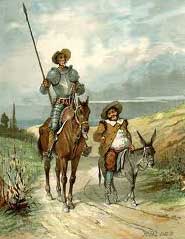Books to learn Spanish

Learning a new language can be a bit daunting at first, especially if the language you're trying to learn is very different from your mother tongue. However, remember that all it takes to learn a new language is perseverance and patience. Anyone can learn Spanish! You just have to take your time and practice, practice, practice. The best option would be to study spanish abroad, where you'll be practicing 24/7!
How to learn Spanish with books
One of the ways to learn Spanish is by reading Spanish books. At first it's hard, but it will help you build up your vocabulary, and soon you'll be reading in Spanish with no problem! Remember, however, that you will have to start by reading children's books (or something as easy) and progress slowly towards books closer to your age range.
Here are some techniques that may be useful:
- Choose the right Spanish books, make sure they're simple and easy to understand. We have a list of appropriate books for beginners, check those out and see if anyone of them interests you. Keep in mind that you have to speak a little Spanish before attempting to read a book, otherwise you won't understand a thing!
- Don't check the Dictionary immediately for words you don't understand, try to figure out their meaning by context. Once you think you've figured it out, check the Dictionary to make sure you're right. This will make it easier to remember what you've learned.
- Study the structure of the sentences. Think at how you'd say that in English and how it's said in Spanish. Check for repeating structures and try to associate them to a type of sentence: negative, positive, interrogation...
- Try and write simple texts based on the book, changing the sentences around to suit your meaning. Understanding the text doesn't mean you'll be able to write it, you'll have to practice at creating sentences first. This will also help you get acquainted with the spelling of Spanish.
- Practice. This is the most important step. If you spend three hours a day reading Spanish, it won't matter a bit if you're not practicing your speech. Find a friend and read out loud to them, explaining the meaning of the sentences as you go. Try to record yourself and see if you can understand what you're reading. And if any of your friends speak even a little Spanish, try to meet with them and have simple conversations. It may not seem like much, but it can really help commit structure and vocabulary to memory.
- Be persistent. Reading kids books may be boring after a while, but remember that a language can only be learned by repetition and practice, and that if you stop in the middle of your learning you will find it hard to remember everything else later.

Books to help you learn Spanish

Most of the Spanish books in this page are very difficult for beginners, especially those written in old Spanish like Don Quixote. You can attempt to read them later, when you've been learning Spanish for some time, or if you decide to take a Spanish course in Spain (the Spanish immersion will make your learning experience quicker and more fun). Meanwhile, there are thousands of other less ambitious books that will really help you to learn Spanish.
Spanish books for beginners (A1-A2)
We all agree the best children's tales are the classic ones from the Grimm Brothers or Christian Andersen. If you've already read them in English, it will be even easier to understand them in Spanish, and you can compare one to the other to help you learn even more. So, do you feel like giving them a try?
Spanish books for mid-level (B1-B2)
If you're at this level, you're probably ready to read some more complex stuff like short stories. Again, a good idea is to try and read Spanish books you've already read in English so you can grasp the concepts easily enough and the reading won't become boring. Here's an excellent page with the best short stories of the universal literature, and if you feel like trying your hand at something more complex, Pio Baroja and Ruben Dario has some excellent tales.
Spanish books for fluent speakers (C1-C2)
At this level you're probably able to read almost any Spanish books mentioned on this page, except maybe the books written in old Spanish. We recommend you try out books like "Platero y yo", "Lazarillo de Tormes", "Crónica de una muerte anunciada" or "La familia de Pascual Duarte", for example. However, remember these are just suggestions and you can look for some books that may be more to your liking.

